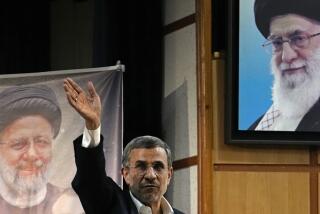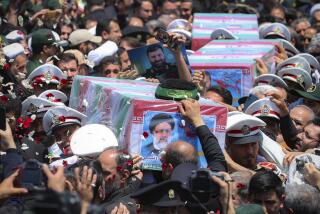If a More Moderate Era Comes to Post-Khomeini Iran, It Will Be Slow in Arriving
- Share via
The era of Ayatollah Ruhollah Khomeini, who died in Tehran on Saturday, witnessed a radical reversal in Iran’s regional and international role and in many of its foreign policies. Khomeini, claiming spiritual leadership of the Islamic world, believed that he had a special mission: to reinvigorate the Muslim community for confrontation with the two hostile superpowers and an exploitative West.
Under Khomeini, Iran’s foreign policy underwent dramatic changes. The shah viewed the United States as Iran’s closest ally; Khomeini labeled it the “Great Satan” and Iran’s principal enemy. The shah befriended Israel; Khomeini called for Israel’s destruction. The shah sought alliances with the moderate states of the Middle East such as Egypt; Khomeini, with Arabic radicals such as Syria and Libya.
The shah saw himself as guarantor of Persian Gulf stability; Khomeini sought to destabilize gulf regimes. And while under the shah, Iran established a reasonable working relationship with Iraq, under Khomeini, Iraq invaded Iran, launching a bloody, destructive war that ended only eight years later.
Khomeini, moreover, came to power believing Muslim states could stand up to the West and to the communist world--each the purveyor of an alien and dangerous culture--by reverting to Islam. He sought to encourage other Muslim states to follow the Iranian example, to overthrow regimes he regarded as subservient to the West, and to establish Islamic governments on the Iranian model.
Khomeini won admiration, even adulation, in many parts of the Islamic world for standing up to America and humiliating the Great Satan. But the limits of his vision and Iran’s influence became evident even during his own lifetime. Iran did succeed in spreading its version of revolutionary Islam among Lebanon’s disadvantaged Shiites. But it was unable to export the revolution to other Persian Gulf states, and the example of the Iranian revolution has not been duplicated elsewhere in the Islamic world. The war with Iraq was enormously destructive in human life and in material terms.
Iran, it is true, helped fuel resistance to Israel in Lebanon but the enmity toward Israel has often been a matter of words rather than action. Iran, after all, bought arms from the Israelis. During the Iran-Contra affair, Iran dealt and negotiated with the United States. Repeatedly the country has reached out for normalization of relations with West European states.
Indeed, these two strains of fierce hostility to the West and a search for accommodation often have been pursued, sometimes simultaneously, sometimes in bewildering succession, in Khomeini’s Iran. The inconsistency is itself a reflection of the division in Iran’s leadership. If Khomeini had at times listened to the advocates of accommodation, his instinct toward confrontation and hostility to the West repeatedly asserted itself.
It is hard to believe any successor to Khomeini would enjoy the powerful devotion he could arouse both in Iran and in other parts of the Islamic world. A “death sentence,” such as that issued by Khomeini against Salman Rushdie, the author of “The Satanic Verses,” would hardly carry the same weight or arouse the same passions issued by any conceivable successor.
However, it would be wrong to anticipate a sudden shift in Iran’s foreign policy in the post-Khomeini period. There are powerful constituencies within the Iranian leadership opposed to normalization with western Europe, let alone with the United States. Over the next two months, Iran’s leaders will be absorbed in revision of the constitution to ensure stability and viable government in the difficult post-Khomeini period.
Even those who favor more moderate policies abroad will wish to avoid being accused by rivals of compromise or of abandoning the Khomeini legacy. The regime is limited in its freedom of action by many years of anti-Western rhetoric and the fierce assertion of the principle of Iranian independence and self-sufficiency. The next few months will not be a time for new initiatives.
Nevertheless, Iran cannot continue as an international pariah. The repeated, if often abortive attempts to normalize relations with Europe and to repair relations with the Persian Gulf states, and the more moderate Iranian position in the Organizaton of Petroleum Exporting Countries (OPEC) reflect a realization at least in one faction in the Iranian leadership that Iran needs to trade, sell oil, secure international credit and technology, and get on with the task of postwar reconstruction. The pragmatists will in due course reassert themselves, but they will need time.
More to Read
Sign up for Essential California
The most important California stories and recommendations in your inbox every morning.
You may occasionally receive promotional content from the Los Angeles Times.













